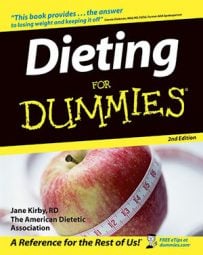If you have resolved to lose weight this year, you need to know what dieting strategies work. Many people will tell you not to eat late at night, or never eat between meals. This advice, is just plain wrong. Here are ten common myths dieting:
Eating late packs on the pounds: The kinds of foods you’re eating put on the weight, not the clock. Your body doesn’t process calories differently after dark. However, the foods that people tend to go for in front of the TV after dinner — chips, ice cream, chocolate treats, and the like — are usually high in fat and calories.
Consume fewer calories to achieve a breakthrough: You may share the common misconception that eating fewer calories can help you break through a weight-loss plateau. However, if you eat fewer than 800 to 1,000 calories a day, your body will conserve every calorie it can get. The only way to keep your metabolism purring is to exercise. When weight loss slows, walk a little longer, work out more frequently or more intensely, and don’t forget to eat.
Never have seconds: Instead of using a plate of food or a predetermined serving size as a yardstick for how much you should eat, try taking hunger and fullness cues from your body. Eating according to your appetite is much healthier. And when you eat slowly, recognizing when you’ve had enough is much easier.
Deny your cravings: Sometimes, the faster you give in and have a small portion of the food that you’re craving, the better off you are. Have a small serving of the food you crave and get over it.
Don’t eat between meals: Most people need to eat every three to four hours to avoid getting too hungry, which often leads to overeating. Dividing your calories into three meals and two or three snacks, instead of only three meals, can keep you well fueled for the day.
Eating breakfast makes you hungry all day: Many typical breakfast foods, while initially satisfying, are out of your system in about 30 minutes, and you need (and want) to eat again.
Breakfast foods that have some protein and a little fat, in addition to complex carbohydrates and sugars, stay with you longer and give you the energy you need to make it through the morning. Whole-grain cereal with lowfat or fat-free milk, an egg on toast, and even a fruity breakfast shake made with lowfat or fat-free milk are good choices.
To lose weight, become a vegetarian: A vegetarian diet can be high in fat and cholesterol, low in fiber, or both. Many vegetarian foods, including cheese and nuts, are high in fat and calories. So cutting out meat and replacing it with other equally fatty vegetarian foods isn’t only a bad diet move, but it may also increase your chances for nutritional.
Fasting drops the pounds: Some dieters will tell you that fasting for a few days drops the pounds quickly and shrinks your stomach. You may drop pounds if you fast, but some of that weight is muscle and most of it is water. You need to eat protein foods, such as lean meat, eggs, lowfat or fat-free milk, or legumes (beans and peas), or you’ll be thin and flabby, not thin and shapely.
You can eat everything that’s fat free: Fat-free foods aren’t calorie-free foods; check the Nutrition Facts panel on the food label. Many have just as many calories as the original versions, and a few have even more.
Some foods burn more calories than they contain: You may have heard this myth in regard to apples, grapefruit, and other fruits. Unfortunately that’s like returning from a trip before you left. Your body burns calories as it digests and metabolizes foods, but it’s only about 10 percent of the calories you need each day.

